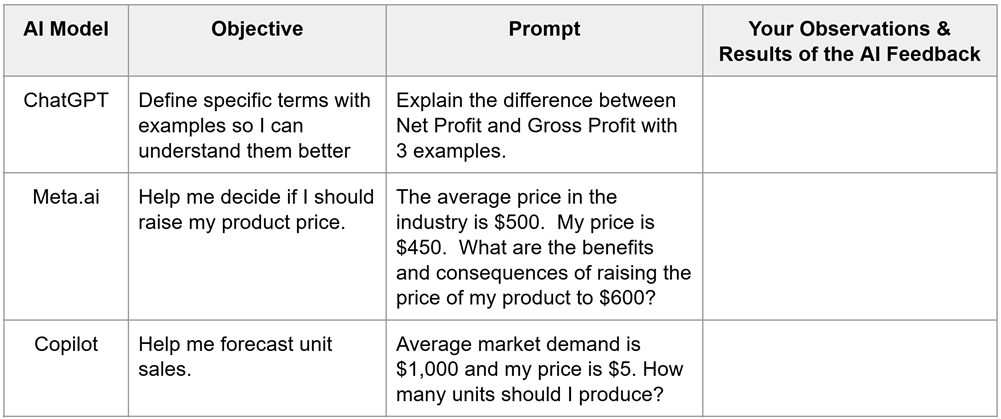
How Students Can Develop AI Prompting Skills By Playing Business Simulations
Artificial Intelligence (AI), particularly Large Language Models (LLMs), has revolutionized many fields, including education. While AI presents exciting opportunities, it also raises challenges for educators concerned about students using it to complete work independently rather than developing essential skills themselves.
However, learning how to effectively use AI is just as critical as learning without it —students who fail to develop AI proficiency will face significant disadvantages in the workforce.
The following activity is designed to help students enhance their AI skills while engaging with business simulations, like GoVenture simulations
Instructors may assign this activity to their students as part of their curriculum.
About GoVenture and AI
- GoVenture simulations cover a wide range of topics, including business, project management, digital marketing, and more. These simulations are dynamic, responding to student decisions in real time, creating a personalized learn-by-doing experience.
- Importantly, GoVenture is designed so that AI cannot be used to “cheat” the system. Instead, AI serves as a tool for students to improve their decision-making skills rather than simply providing answers. This ensures a fair and meaningful learning experience while fostering AI literacy.
Instructor Guidelines
Instructors can customize the following activity to fit their curriculum. When making adjustments, consider:
- Student time investment—How much time should students spend on this AI activity?
- Assessment requirements—This activity requires manual evaluation, how will you assess student responses?
- AI model comparisons: If this is a core part of the curriculum, students may benefit from comparing multiple AI models or applying AI across various objectives.
The provided activity template includes bold-italicized text indicating time-intensive components, allowing instructors to modify them based on their needs.
Student Activity
Objective
To develop AI prompting skills and practice using AI in a real-world context while engaging with a GoVenture simulation.
Activities
As you play GoVenture, use AI to assist with at least three of the following activities:
- Understand Subject Terminology
- Receive Coaching Advice
- Identify Risks and Opportunities
- Evaluate the Consequences of Decisions
- Analyze Data
- Predict Future Outcomes
- Apply Statistical Modeling
- Optimize Metrics
Considerations
The effectiveness of AI depends on several factors:
- The AI model you choose.
- The quality of your prompts.
- The data and context you provide in your prompts.
- How you interpret AI-generated feedback.
- The accuracy and reliability of AI responses.
AI Models
Use two or more AI models to compare their performance. Examples include ChatGPT, Meta.ai, Copilot, Gemini, or any other AI model of your choice.
Instructions
While playing GoVenture, use AI and record your objectives and results in an AI Activity Logsimilar to the examples below:

Final Submission
When you complete the GoVenture simulation, submit your AI Activity Log along with answers to the Reflection Questions below in one of these formats:
- Written Report (Maximum 500 words)
- Slide Deck (Maximum 10 slides)
- Video Presentation (5 minutes)
- Live Presentation (5 minutes)
Reflection Questions
Answer 10 questions:
- How did different AI models compare in terms of accuracy, detail, and usefulness?
- Which AI-generated insights were most helpful, and how did they impact your decision-making?
- Did any AI suggestions lead to unexpected outcomes in the simulation? If so, what were they?
- How did you refine your prompts to improve the relevance and quality of AI responses?
- What were the biggest limitations of using AI in this simulation? How did you work around them?
- To what extent did AI align with your own critical thinking and problem-solving abilities?
- How would you apply AI prompting techniques learned in this activity to real-world decisions?
- Were there any differences in how AI models handled numerical data versus strategic advice?
- Did AI responses ever conflict with your own instincts or prior knowledge? How did you resolve this?
- If you had unlimited access to AI tools, how would you integrate them into future learning or professional work?
Receive this newsletter by email —
I'm Mathew Georghiou and I write about how games are transforming education and learning. I also share my experience as an entrepreneur inventing products and designing educational resources used by millions around the world. More about me at Georghiou.com